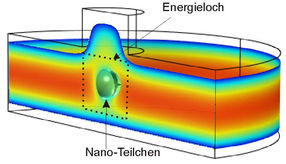Failed Alzheimer’s test shows in which direction the research should continue
Advertisement
Disappointing results in clinical Alzheimer’s studies discourage doctors and scientists from continuing their research into ɣ-secretases and a possible treatment against Alzheimer’s disease. In Cell, the Alzheimer’s expert Bart De Strooper (VIB-KU Leuven) argues that these studies are not pointless, but merely indicate what the next steps should be for the Alzheimer’s research.
Bart De Strooper: "We need to learn from AIDS, cholesterol or cancer research: we can only find a drug to treat Alzheimer’s disease if we are willing to learn from the difficulties that we encounter. The current pessimistic mood does not answer the patients’ needs."
The ɣ-secretase complex
Alzheimer’s disease is characterized by abnormal accumulations of a protein (amyloid β; Aβ) between the brain cells; the so-called amyloid plaques. Several years ago Bart De Strooper and his team unraveled the structure and the function of the γ-secretase complex, which plays a significant role in the development of these plaques.
Disappointing results in clinical Alzheimer’s studies
For many years the ɣ-secretases were the target for the development of a drug to treat Alzheimer’s disease. It was thought that blocking these ɣ-secretases would combat the production of the plaques and thereby prevent nerve cells from dying. “Semagacestat” (Eli Lilly) is one of the many examples of candidate drugs that were tested in a clinical setting. The failure of the phase 3 clinical tests (these tests are performed on patients) involving semagacestat resulted in the sudden termination of ɣ-secretase research. Unfortunately, this effect was not only noticeable in the pharmaceutical industry; the academic world also reacted with disappointment.
Lessons for future Alzheimer’s research
In the journal Cell, Bart De Strooper implores scientists to apply what they have learnt from these studies to future research. Many arguments indicate that Aβ-peptides do play a role in Alzheimer’s disease, so it remains very important to test the hypothesis of the amyloid plaques extensively. Furthermore, thorough fundamental research remains essential, considering the fact that the current knowledge gap between the biology, physiology and structural biology of ɣ-secretases is still very large. New insights and an improved understanding of ɣ-secretases must form the foundation for a more rational development of a drug.
Original publication
Bart De Strooper; "Lessons from a failed ɣ-secretase Alzheimer trial."; Cell 2014.




























































